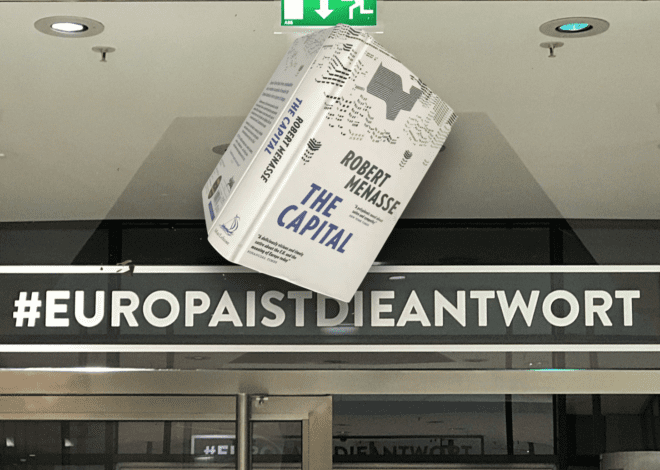Lead Review
- Book: The Capital
- Location: Brussels
- Author: Robert Menasse
 This is a timely novel set in Brussels, the city at the heart of the EU. It is the story of individuals in the amorphous mass that is the chugging engine of Europe. The 50th anniversary of the European Commission is coming up and there is much discussion about how best to mark the occasion. Fenia Xenopoulou is in charge and comes up with the notion of putting Auschwitz at the heart of the celebrations. Why wouldn’t you…?
This is a timely novel set in Brussels, the city at the heart of the EU. It is the story of individuals in the amorphous mass that is the chugging engine of Europe. The 50th anniversary of the European Commission is coming up and there is much discussion about how best to mark the occasion. Fenia Xenopoulou is in charge and comes up with the notion of putting Auschwitz at the heart of the celebrations. Why wouldn’t you…?
Meanwhile there is a murder case which is being suppressed, the victim was not the intended one. And as the blue lights first arrive at the scene, there are sightings of a domestic pig. The author uses a porcine leitmotif throughout his novel, from discussions about the export of pork to China to pig book ends and little figurines on a grave. The pig, in some cultures can be a symbol of abundance and fertility. Here? Well, that remains to be seen.
Brussels as a city comes to life “It had stopped raining. The wet tarmac, the façades of buildings and the passers-by shimmered in the light of the streetlamp and the neon of the chip stand, as if a Flemish master had just applied the varnish to this scene“. The style of writing can have a very painterly quality to it.
The Capital is the winner of the German Book Prize 2017. The translation still has a resonant feel of the original language which, for me, works well. As far as the storyline goes I enjoyed the first half, the wit and observation were delightful, but as the book progressed I found just a touch of ennui setting in that never really dissipated – perhaps that was however due to the blanket coverage of the debilitating Brexit shambles currently unfolding in the UK.
The book is a satire of the European ideal, the European Commission is a unifying über-power overcoming nationalism, paternally steering the individual countries under its aegis. Although in German the book is called Die Hauptstadt, I am sure, with the English title, there is just a nod to Karl Marx’s Das Kapital, the seminal work on materialist philosophy, economics and politics (and mention of that takes me right out of my comfort zone). The novel is certainly a sweeping undertaking. For me the patchwork of stories became a little too disparate and it sometimes felt hard to keep all the plates spinning in tandem. The storyline reflects the modern conundrum.
What will pro and anti brexit individuals make of this novel, I wonder?
“But what significance do interrelationships, entanglements and connections have if those concerned know nothing of them?” Perhaps this is the existentialist novel for this period of the 21st Century?


 Please wait...
Please wait...
